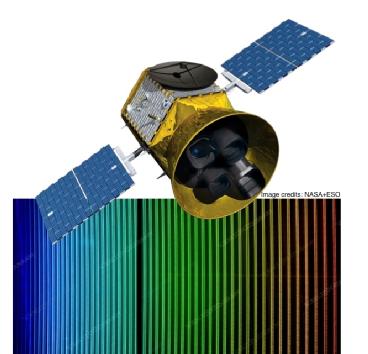Postdoctoral Research Fellow in Exoplanet Atmospheres
The Department of Physics seeks to appoint a motivated and driven Research Fellow within the Astronomy and Astrophysics Group. The appointment will be for 2 years and funding is available for a start between 1 October 2021 and 31 January 2022 (a later starting date can also be negotiated). Applications for a part-time position will be considered.
The successful candidate will work with Dr Matteo Brogi on the project “Studying the atmospheres of TESS planets at high spectral resolution”, funded by the Science and Technology Facilities Council (STFC). The post can flexibly focus on a number of relevant topics in high resolution spectroscopy, including data analysis, cross-correlation, and modelling of atmospheres. In addition, 25% of the post will be devoted to collaborating with Dr Heather Cegla and studying the effects of stellar variability on the measured spectra of exoplanets.
The project will rely on infrared spectroscopy obtained at a range of ground-based telescopes (VLT, CAHA3.5, TNG,
Gemini-S), through guaranteed, open-access time, and large programs with US collaborators. The successful applicant will be playing a key role in the analysis, modelling, and interpretation of these observations. There is one post available and it may be focused on observational skills or on modelling. For a post focussed on observational skills, the post-holder will apply data-processing techniques to remove the contamination of the Earth, cross-correlate with model spectra, and perform model discrimination via Bayesian analysis. For a post focussed on modelling, the post-holder will calculate spectra of planetary atmospheres ranging from giants to super-Earths, and from ultra-hot (>2,500 K) to cooler (sub-1000 K) objects. They will subsequently integrate their modelling into Bayesian retrieval techniques. The post is flexible and can be adapted to any combination of the above skills. Support and guidance from Dr Siddharth Gandhi will be available throughout the entire project. Dr Gandhi has already set up a working Bayesian retrieval framework at Warwick and will be regularly visiting for the entire duration of the post.
Candidates will hold, or be about to be awarded, a PhD or equivalent in astronomy or astrophysics. Candidates will be strong communicators capable of working effectively both independently and as part of a research team, with solid planning and time management skills to ensure the research objectives are achieved effectively. Independent research and existing collaborations are encouraged. The successful candidate will also have access to the network of collaborators of Dr Brogi, which spans national (Oxford, UCL), European (Leiden Observatory, UvA, INAF), and US-based (ASU, UMichigan, UChicago) institutions.
For a post with an observational focus, experience with stellar or planetary high-resolution spectroscopy is preferred. For a post focussed on modelling, previous experience with line-by-line radiative transfer and/or familiarity with the molecular opacity calculations is preferred.
An application form must be completed if you wish to be considered for this post, along with a CV including publication metrics, a concise research statement and a statement about Equality, Diversity, and Inclusion.
If you have not yet been awarded your PhD but are near submission or have recently submitted your PhD, any offer of employment will be made as Research Assistant on level 5 of the University grade structure Upon successful award of your PhD and evidence of this fact, you will be promoted to Research Fellow on the first point of the level 6 of the University grade structure.
The Physics Department and the University of Warwick are proud of their diverse community of staff, students, and visitors, and are committed to maintaining an excellent record in teaching and research by ensuring that there is equality of opportunity for all, fostered in an environment of mutual respect and dignity. Both the Physics Department and the University of Warwick hold Athena SWAN Silver awards, a national initiative to promote gender equality for all staff and students. The Physics Department is also a Juno Champion, which is an award from the Institute of Physics to recognise our efforts to address the under-representation of women in university physics and to encourage better practice for both women and men.
Please apply here!
Application deadline is 1 Oct 2021.
Please keep an eye on this page!
Please direct all informal inquiries to Dr Matteo Brogi (m.brogi [at] warwick.ac.uk)
Interview Date: TBD
